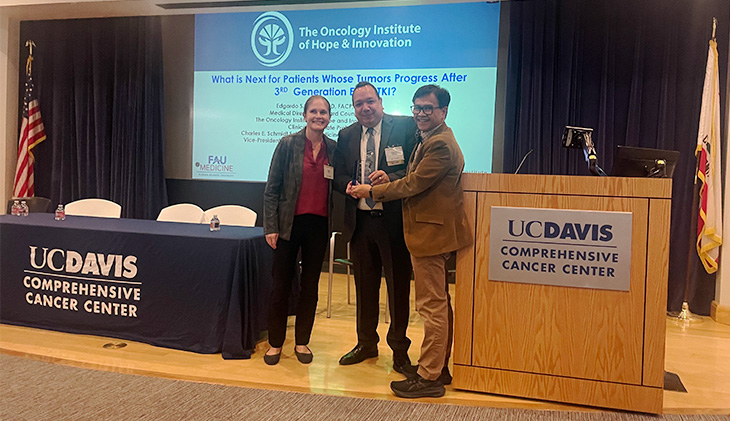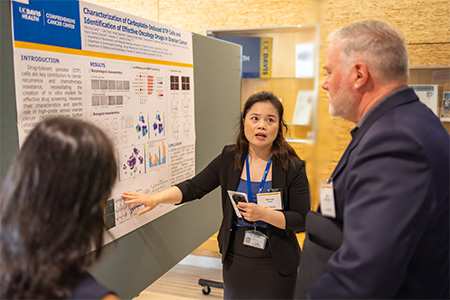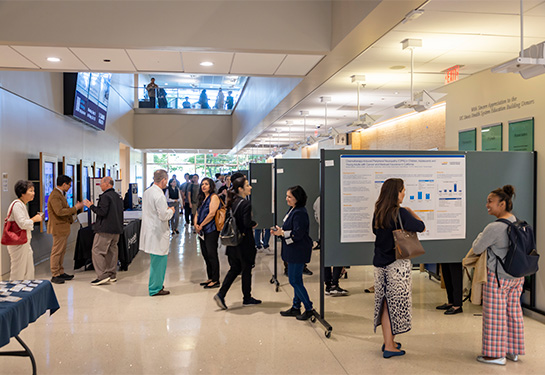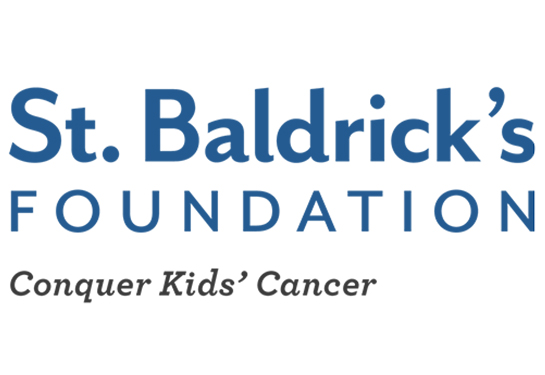Scientists come together to share cancer research findings
30th Annual Cancer Research Symposium reports on new breakthroughs and features poster competition
UC Davis Comprehensive Cancer Center held its 30th Annual Cancer Research Symposium on Oct. 10 and 11, bringing together scientists and students working to find a cure for cancer.
“Our research symposium gives us the opportunity to highlight exciting new research and introduce new faculty,” said cancer center Director Primo “Lucky” Lara Jr., who provided the introduction and welcome to the symposium. “It also provides a platform for our early stage investigators and trainees, our next generation of cancer researchers, to present their findings and to compete to win cash prizes.”

A focus on diversity, equity and accessibility and reducing disparities
The symposium’s opening session on inclusion, diversity, equity and accessibility was chaired by David Cooke, cancer center interim physician-in-chief and associate director of the cancer center’s Inclusivity, Diversity, Equity and Accessibility Office.

Colmar Figueroa-Moseley, co-chair of the Southwest Oncology Group Cancer Research Network GI Health Equity and Research Development sub-committee gave the keynote address. The focus was improving diversity and representation in cancer clinical trials.
Shehnaz Hussain, associate director for population sciences at the cancer center, chaired a session on population sciences and health disparities. It included presentations on lung cancer screening and the use of spatial data to study environmental drivers of cancer risk. There were also talks on flavored tobacco and vaping in youth and caregiving for geriatric patients in clinical trials.
A session on career development and education wrapped up day one of the symposium. It was chaired by Associate Director of the cancer center’s Education Training and Career Development Frederick J. Meyers. The final two sessions, both chaired by the cancer center’s Chief Science Officer Xiao-Jing Wang, focused on basic and translational science and a new basic science research program.
Highlighting community engagement and outreach
There were two sessions on the final day of the symposium. The first, on community outreach and engagement, was co-chaired by Moon Chen, advisor to the cancer center director, and Elisa Tong, assistant director of population science and director of the Tobacco Cessation Policy and Research Center. Chen and Tong served as moderators of a panel discussion on co-designing intervention research among Native Americans.
The final session was chaired by Megan Daly, associate director for clinical research, and centered on clinical trials.
David R. Gandara Lectureship Award
The final keynote speaker, Edgardo S. Santos Castillero, was presented with the David R. Gandara Lectureship on Developmental Therapeutics Award. Castillero is the medical director of Broward, Florida, and practices at The Oncology Institute of Hope and Innovation. He specializes in lung cancer.
The award is presented annually at the symposium to honor the work of Gandara, who is professor emeritus and serves as the co-director of the cancer center’s new Center for Experimental Therapeutics in Cancer.
Poster presentations and competition
More than 70 poster presentations were also on display in the UC Davis Health education building. Seasoned cancer investigators as well as postdoctoral research scholars and graduate students highlighted their innovative science and competed for cash prizes.
The winners were:
1st Place – Matthew Braga, Graduate Student ($750)
Collaborators: Alexandra Calderon, Jennifer Cash, Sean Collins
Title: Rhogefs Gone Rhogue: Investigating the Mechanisms by which PDZ-Rhogef Drives Cancer Cell Migration
2nd Place – Daniela Jimenez, Graduate Student ($500)
Collaborators: Ryan G. Toedebusch, Frederick J. Meyers, Yuanpei Li, Christine M. Toedebusch
Title: Olfactomedin-like 3 Neutralization Extended Survival in a Mouse Model of Glioblastoma
3rd Place – Bryan Correa Gonzalez, Undergraduate Student ($350)
Collaborators: Love Moore, Akshaya Karthikeyan, Anamitra Bhaumik, Ethan Sandoval, Alan Lombard
Title: Characterizing PARP Inhibitor and AR Pathway Inhibitor Responses in Advanced Prostate Cancer
UC Davis Comprehensive Cancer Center
UC Davis Comprehensive Cancer Center is the only National Cancer Institute-designated center serving the Central Valley and inland Northern California, a region of more than 6 million people. Its specialists provide compassionate, comprehensive care for more than 100,000 adults and children every year and access to more than 200 active clinical trials at any given time. Its innovative research program engages more than 240 scientists at UC Davis who work collaboratively to advance discovery of new tools to diagnose and treat cancer. Patients have access to leading-edge care, including immunotherapy and other targeted treatments. Its Office of Community Outreach and Engagement addresses disparities in cancer outcomes across diverse populations, and the cancer center provides comprehensive education and workforce development programs for the next generation of clinicians and scientists. For more information, visit cancer.ucdavis.edu.




